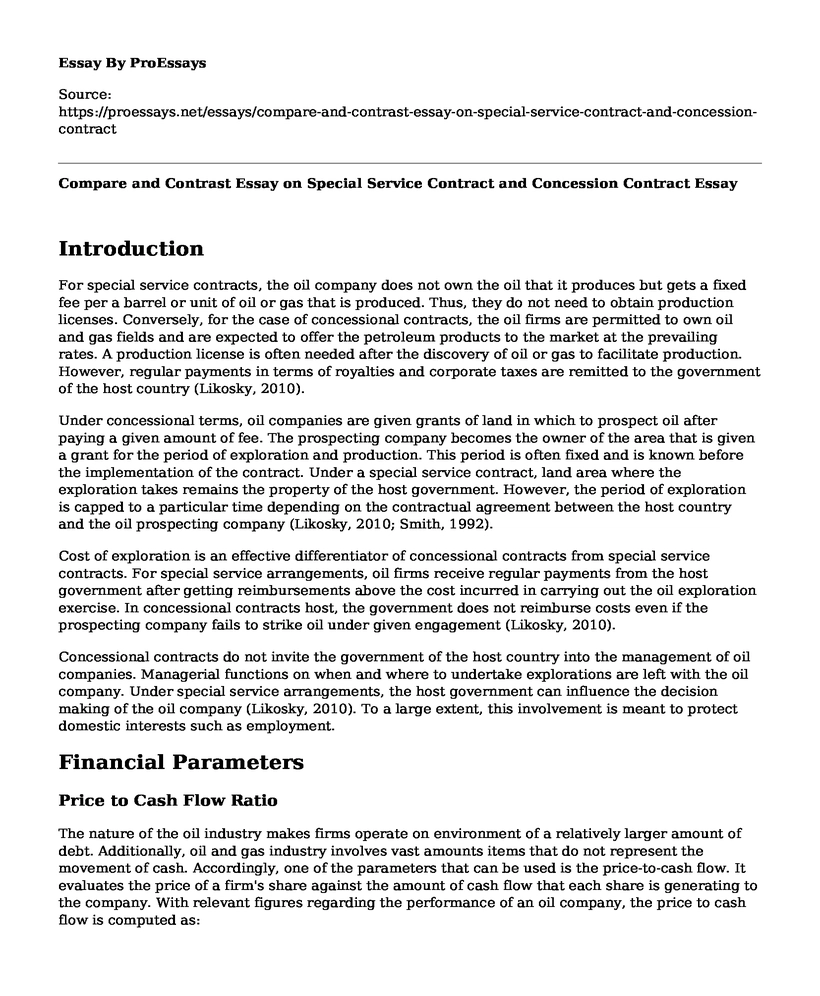Introduction
For special service contracts, the oil company does not own the oil that it produces but gets a fixed fee per a barrel or unit of oil or gas that is produced. Thus, they do not need to obtain production licenses. Conversely, for the case of concessional contracts, the oil firms are permitted to own oil and gas fields and are expected to offer the petroleum products to the market at the prevailing rates. A production license is often needed after the discovery of oil or gas to facilitate production. However, regular payments in terms of royalties and corporate taxes are remitted to the government of the host country (Likosky, 2010).
Under concessional terms, oil companies are given grants of land in which to prospect oil after paying a given amount of fee. The prospecting company becomes the owner of the area that is given a grant for the period of exploration and production. This period is often fixed and is known before the implementation of the contract. Under a special service contract, land area where the exploration takes remains the property of the host government. However, the period of exploration is capped to a particular time depending on the contractual agreement between the host country and the oil prospecting company (Likosky, 2010; Smith, 1992).
Cost of exploration is an effective differentiator of concessional contracts from special service contracts. For special service arrangements, oil firms receive regular payments from the host government after getting reimbursements above the cost incurred in carrying out the oil exploration exercise. In concessional contracts host, the government does not reimburse costs even if the prospecting company fails to strike oil under given engagement (Likosky, 2010).
Concessional contracts do not invite the government of the host country into the management of oil companies. Managerial functions on when and where to undertake explorations are left with the oil company. Under special service arrangements, the host government can influence the decision making of the oil company (Likosky, 2010). To a large extent, this involvement is meant to protect domestic interests such as employment.
Financial Parameters
Price to Cash Flow Ratio
The nature of the oil industry makes firms operate on environment of a relatively larger amount of debt. Additionally, oil and gas industry involves vast amounts items that do not represent the movement of cash. Accordingly, one of the parameters that can be used is the price-to-cash flow. It evaluates the price of a firm's share against the amount of cash flow that each share is generating to the company. With relevant figures regarding the performance of an oil company, the price to cash flow is computed as:
Price to Cash Flow Ratio = Stock price/cash flow per share (Plewa & Friedlob, 1995).
Reserve Life Index
The amount of reserves of oil in a given area is critical in oil exploration and production. In the oil industry, production is derived from the available reserves, and reserve availability determines the number of years that production is expected to take place (Kaiser & Yu, 2012). Oil reserves can be depleted. Reserve life index measures the extent to which current reserves are expected to last at the present rate of production with the assumption that addition of oil and gas does not take place during the period of production (Apergis, Ewing, & Payne, 2016). Understanding of this ratio is critical in the sense that it affects the long-term strategies of an organization as well impacts on fuel prices.
References
Apergis, N., Ewing, B. T., & Payne, J. E. (2016). Oil reserve life and the influence of crude oil prices: An analysis of Texas reserves. Energy Economics, 55(2016), 266-271. doi:10.1016/j.eneco.2016.02.009
Kaiser, M. J., & Yu, Y. (2012). Part 1: Oil and gas company valuation, reserves, and production. Retrieved from http://www.ogfj.com/articles/print/volume-9/issue-2/features/part-1-oil-and-gas-company.html
Likosky, M. (2010). Contracting and regulatory issues in the oil and gas and metallic minerals industries. Transnational Corporations, 18(1), 1-42. doi:10.18356/a528fffd-en
Plewa, F. J., & Friedlob, G. T. (1995). Understanding cash flow. New York: John Wiley & Sons.
Smith, E. E. (1992). From concessions to service contracts. Tulsa Law Review, 27(4), 1-33.
Cite this page
Compare and Contrast Essay on Special Service Contract and Concession Contract. (2022, May 21). Retrieved from https://proessays.net/essays/compare-and-contrast-essay-on-special-service-contract-and-concession-contract
If you are the original author of this essay and no longer wish to have it published on the ProEssays website, please click below to request its removal:
- Fluid Mechanics Field: Personal Statement Example
- Advantages and Disadvantages of Crude Oil
- Research Paper Example on Improvements in the Tourism and Hospitality Field in Morocco
- Coffee House Description of the Business Plan Paper Example
- The Methodology of Underwater Concrete Pouring Essay
- The Engineering and Construction Career Path: Where to Begin?
- Chocolate Companies and Systemic Moral Issues: The Failed Slave-Free Bill - Essay Sample







